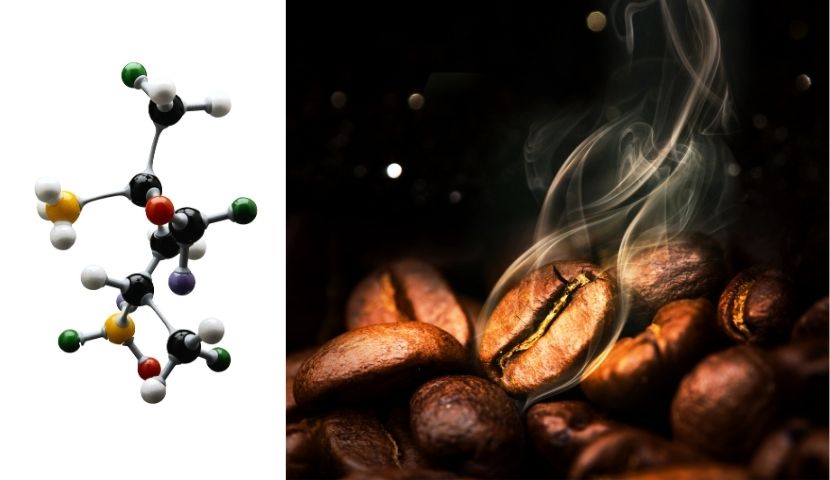Coffee isn’t just a morning pick-me-up; it’s a beverage deeply embedded in cultures around the world. Beyond its rich aroma and stimulating effects, coffee has been shown to have a surprising impact on appetite and weight management. Many coffee enthusiasts swear by its ability to curb their cravings, but how exactly does it work? Is there scientific evidence backing up these claims?
Let’s take a deep dive into the mechanisms that make coffee a potential appetite suppressant.

The Role of Coffee & Caffeine in Appetite Suppression
What Is Caffeine?
Caffeine is a natural stimulant found in coffee beans, tea, and various other plants. It primarily works by blocking adenosine receptors in the brain, which helps to increase alertness and reduce feelings of fatigue.
But caffeine’s influence doesn’t stop there. It also impacts a range of physiological functions, including metabolism and appetite regulation. When consumed in moderation, caffeine has been shown to activate the central nervous system, which, in turn, can influence appetite control mechanisms.
Studies suggest that caffeine affects appetite by impacting certain hormones and neurotransmitters. But what hormones are at play here? Let’s explore this further.
Caffeine’s Effect on Hunger and Satiety
Several studies have indicated that caffeine intake can reduce feelings of hunger, especially when consumed about 30 minutes to 4 hours before a meal. The mechanism behind this appetite suppression seems to be multifaceted, involving the interaction of caffeine with key appetite-regulating hormones and neurotransmitters.
Check our top coffee makers list
Coffee’s Influence on Appetite-Regulating Hormones

Ghrelin: The Hunger Hormone
Ghrelin is often referred to as the “hunger hormone” because it signals to the brain that it’s time to eat. Interestingly, caffeine has been found to reduce the levels of ghrelin in the body, which results in a decrease in hunger. A reduction in ghrelin levels means that the body doesn’t experience the same intense hunger signals, potentially leading to reduced food intake.
Research shows that ghrelin is released when the stomach is empty, signaling the brain to initiate the sensation of hunger. By lowering ghrelin levels, coffee acts as a natural appetite suppressant.
Leptin: The Satiety Hormone
Leptin is another key hormone that plays a role in appetite regulation. It sends signals to the brain to indicate that the body has sufficient energy stores and is full. Caffeine appears to increase leptin sensitivity, meaning that the body becomes more efficient at recognizing the feeling of fullness.
This could result in better appetite control, as the body is better able to recognize when it’s satisfied and doesn’t need more food.
Cholecystokinin (CCK): The Digestive Hormone
CCK is a hormone that is released when food enters the digestive tract, and it plays a crucial role in promoting feelings of satiety. Higher CCK levels are associated with a stronger feeling of fullness. Some studies suggest that coffee consumption can increase CCK levels, contributing to reduced hunger and longer-lasting satiety.
You may like reading: https://coffeemakerusa.com/black-coffee-weight-loss-morning/
The Science Behind Coffee and Satiety
Coffee and Gastric Emptying
Gastric emptying refers to the process by which food moves from the stomach to the small intestine. The slower this process, the longer it takes for the stomach to empty, resulting in prolonged feelings of fullness.
Some research has indicated that coffee, particularly its caffeine content, can slow gastric emptying. This slower process may extend the feeling of fullness after a meal, potentially curbing unnecessary snacking and reducing overall food consumption.
Coffee’s Impact on Energy Intake
Moderate coffee consumption has been associated with reduced energy intake during meals. A study published in Appetite suggested that people who consumed coffee before meals ate fewer calories compared to those who did not.
This suggests that coffee not only curbs hunger but can also contribute to reduced calorie intake, helping to manage overall energy balance and weight.
Research Findings on Coffee and Appetite
Study 1: Coffee’s Impact on Appetite and Energy Intake
A study published in the journal Metabolism explored the effects of coffee on appetite and energy intake. The study revealed that participants who consumed coffee experienced a significant reduction in hunger and consumed fewer calories compared to those who didn’t drink coffee. This supports the idea that coffee can effectively reduce appetite and contribute to weight management.
Study 2: Coffee and Hormonal Changes
Another fascinating study looked at the influence of coffee on hunger-regulating hormones. The research showed that drinking coffee reduced ghrelin (the hunger hormone) and increased levels of leptin (the satiety hormone). This hormonal shift indicates that coffee may work through multiple biological pathways to regulate hunger and promote feelings of fullness.
Is Coffee a Potential Appetite Suppressant?
An article from Scientific American discusses how coffee may influence appetite and digestion. It highlights a study where participants who drank coffee had higher levels of serotonin and lower levels of ghrelin, leading to reduced appetite. The article also notes that the effects may vary among individuals.
Green Tea vs Black Coffee: What is Better for Weight Loss?
An article from Times of India compares the effects of green tea and black coffee on weight loss. It mentions that black coffee enhances metabolic rate by 3–11%, reduces appetite, and promotes body fat and BMI reduction. Consuming four cups daily can reduce body fat by 4%.
Read: https://coffeemakerusa.com/black-coffee-weight-loss-morning/
Coffee as a Tool for Weight Management

Metabolic Boost and Thermogenesis
One of the most well-known effects of coffee is its ability to boost metabolism. Caffeine increases the metabolic rate, making the body burn more calories even at rest. This thermogenic effect can play a significant role in weight management, especially when combined with regular physical activity.
Studies have shown that caffeine can increase energy expenditure by as much as 3-11%, making it an effective tool for those looking to lose weight. By enhancing fat oxidation and increasing energy expenditure, coffee becomes more than just an appetite suppressant; it also acts as a catalyst for weight loss.
Fat Oxidation and Weight Loss
In addition to boosting metabolism, caffeine promotes fat oxidation, a process by which the body breaks down stored fat to use as energy. This can be particularly useful for weight loss, as it encourages the body to burn fat instead of carbohydrates. Studies show that caffeine, when consumed before physical activity, enhances fat burning, making it a great pre-workout beverage for those looking to maximize fat loss.
Appetite Control and Weight Loss
By reducing hunger and increasing feelings of fullness, coffee helps control appetite, potentially leading to reduced calorie intake. This dual action of suppressing hunger while promoting fat oxidation makes coffee a valuable ally in any weight management strategy.
Moreover, coffee’s ability to regulate insulin sensitivity plays a critical role in preventing weight gain and promoting healthy metabolic function.
Considerations and Potential Side Effects
Individual Variability
It’s important to note that the effects of coffee on appetite can vary between individuals. Factors like caffeine tolerance, genetics, and overall health can influence how coffee affects hunger levels. Some people may experience a stronger appetite-suppressing effect from coffee, while others may not notice any difference.
Potential Side Effects
While coffee can offer various health benefits, it’s important to consume it in moderation. Excessive coffee consumption can lead to anxiety, jitteriness, sleep disturbances, and digestive issues. If you’re sensitive to caffeine, it’s best to limit your intake or opt for decaffeinated options.
Furthermore, too much caffeine can lead to dehydration, so it’s essential to drink plenty of water alongside your coffee.
Conclusion: Coffee’s Role in Appetite Suppression and Weight Management

Coffee, thanks to its caffeine content, is not just a delicious morning beverage; it can be a powerful tool for appetite suppression and weight management. By influencing hunger hormones like ghrelin, leptin, and CCK, coffee can help reduce feelings of hunger, promote satiety, and ultimately help with weight loss. Additionally, coffee boosts metabolism and enhances fat oxidation, making it an excellent choice for those looking to burn fat and control appetite.
However, it’s important to keep in mind that individual responses to coffee vary. While some may experience significant appetite suppression, others might not feel the same effects. As with any dietary change, moderation is key, and it’s important to listen to your body’s needs.
If you’re looking to incorporate coffee into your weight management strategy, it’s best to consume it in moderation and enjoy it as part of a healthy, balanced lifestyle. Whether you’re sipping a cup to boost energy or curb your appetite, understanding how coffee works can help you make informed choices and maximize its benefits.
Remember: Coffee should be enjoyed as a part of a balanced diet, and not as a quick fix for weight loss. Always prioritize your overall health and well-being.
Sources:



0 Comments